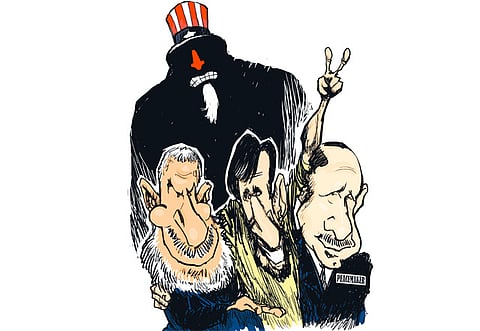Consequences of Iran's proposal
Tehran has consolidated its relations with Turkey and Brazil, while putting noses in Washington and Tel Aviv out of joint

The deal struck in Tehran on May 17 could largely defuse the international crisis over Iran's nuclear activities — if it is accepted by the international community. It must be counted a considerable contribution to the peace of the region and should be widely welcomed.
The architects of the deal, Brazil's President Luiz Inacio Lula da Silva and Turkey's Prime Minister Recep Tayyip Erdogan, will win plaudits throughout the developing world for their mediation, particularly among those who resent American pressures and detest Israel's unashamed militarism, not least Iran itself and most of its Arab neighbours. Turkey's activist Foreign Minister Ahmet Davutoglu is understood to have played a crucial role in the successful outcome.
Hammered out in 18 hours of negotiations with Iran's President Mahmoud Ahmadinejad, the agreement provides for Iran to transfer 1,200 kilograms of low enriched uranium — some 58 per cent of its stock — to Turkey within one month, and to receive in exchange 120 kilograms of higher-enriched uranium for medical purposes within one year. As Turkey itself is not equipped to enrich Iran's uranium to the required level, Russia and France are expected to do the job.
Iran has declared that it will submit the agreement formally to the International Atomic Energy Agency (IAEA) within a week. Tehran has, however, left no doubt that it intends to continue enriching uranium for peaceful purposes, as it is entitled to do under the Nuclear Non-Proliferation Treaty (NPT), of which it is a signatory. Both Lula and Erdogan have indicated that they believe Iran has a right to atomic energy.
It seems clear, therefore, that hopes of forcing Iran to abandon uranium enrichment altogether have so far not succeeded.
The deal has been greeted with scepticism and hostility in the United States and among some of America's allies, which tend to dismiss it as a delaying tactic. The New York Times quoted a senior administration member as saying that the agreement "is not a solution for the core of Iran's enrichment programme".
Indeed, Washington has interpreted the Tehran agreement as an act of defiance of its global authority, an argument which carries weight with other permanent members of the Security Council. Reluctant to see the initiative in important matters of international security slipping from its hands, the Obama administration has persuaded the permanent members of the Council to circulate a tough draft resolution demanding that Iran suspend uranium enrichment, and adding a long list of restrictions on Iranian military, commercial and financial activities. It remains to be seen whether this manoeuvre can succeed.
Israel's hawkish leaders will be particularly enraged by the Tehran agreement. With high drama and talk of another Holocaust, they repeatedly portrayed Iran as a threat to the entire world and pressed for "crippling sanctions" to put an end to its uranium enrichment. They made no secret of their intention to resort to military strikes if sanctions failed to have the desired effect.
Pretext for war
Israel could now be robbed of a pretext for military action. Its propaganda campaign, evidently intended to draw the US into armed confrontation with Iran, may have to be reconsidered. With the Afghan war on his hands, as well as unfinished business in Iraq, US President Barack Obama has made it clear that he is against opening a front against Iran.
The sanctions route — led in shrill terms by Secretary of State Hillary Clinton — was meant as an alternative to military action. The aim was to dissuade Israel from any rash military initiative, which might risk drawing in the United States or exposing its troops, bases and Middle East interests to Iranian retaliation.
By putting pressure on Iran, Washington also hoped to soften Israel's stance in the proximity talks with the Palestinians, which Obama's envoy George Mitchell had managed, after persistent efforts, to get started. All these calculations have proved vain and will now have to be reviewed. Obama's foreign policy in these crucial areas has so far been a failure. But this has not yet been recognised in Washington, where the tendency is to dismiss the Tehran agreement and keep the emphasis on tough sanctions.
Several other significant consequences flow from the Tehran agreement. Iran has consolidated its relations with Turkey and Brazil, two rising global powers. It will feel far less isolated on the international scene. Turkey, in turn, can claim a diplomatic triumph to add to its many foreign policy successes of the past year, engineered by Davutoglu. He has vastly improved relations with Syria, Iraq and Iran, as well as with a score of other countries in the Balkans, the Caucasus and Central Asia, boosting political and trade ties. Relations with Israel, however, have turned distinctly sour.
If the Tehran agreement sticks, it can only further enhance Turkey's beneficent regional role as a mediator and peacemaker. The intractable Arab-Israeli dispute is in urgent need of its attention.
Patrick Seale is a commentator and author of several books on Middle East affairs.


